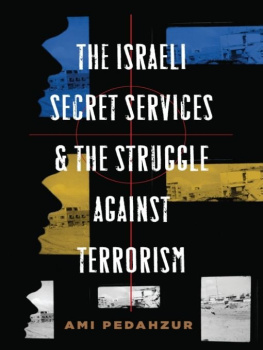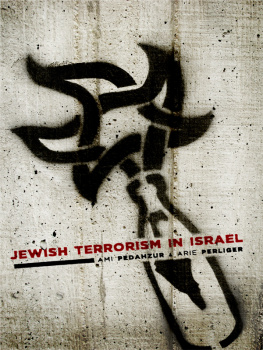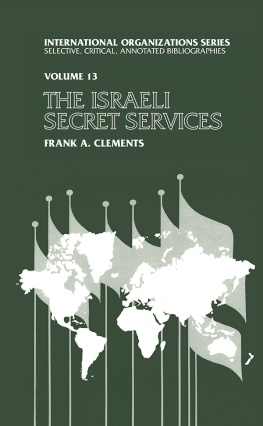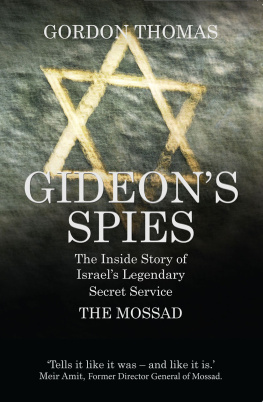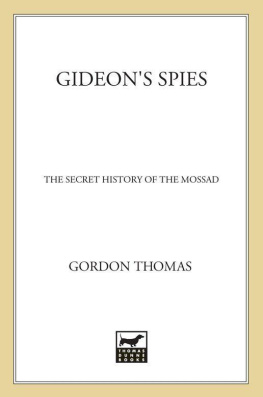COLUMBIA STUDIES IN TERRORISM AND IRREGULAR WARFARE
Bruce Hoffman, Series Editor
This series seeks to fill a conspicuous gap in the burgeoning literature on terrorism, guerrilla warfare, and insurgency. The series adheres to the highest standards of scholarship and discourse and publishes books that elucidate the strategy, operations, means, motivations, and effects posed by terrorist, guerrilla, and insurgent organizations and movements. It thereby provides a solid and increasingly expanding foundation of knowledge on these subjects for students, established scholars, and informed reading audiences alike.
ACKNOWLEDGMENTS
WHILE WORKING ON THIS book, I traveled a long and fascinating road. A number of dear friends and colleagues made my work possible. Arie Perliger, who put his own work aside in order to help me accomplish this mission, conducted interviews in Israel, oversaw the work of research assistants, gathered material himself, and read, commented, and corrected the various chapters over and over again. This book could not have been completed without his constant support, and I owe him so much for that. Special thanks to Alex Bialsky, my research assistant, who spent many days interviewing policymakers, former members of the intelligence community, and senior military officials. He also worked tirelessly in gathering information and meticulously checking and corroborating facts. I owe profound thanks to the interviewees as well, some of whom require the protection of anonymity in the pages that follow.
I owe great thanks, too, to Anne Routon of Columbia University Press, who was my partner in this journey and has always been there to support me with her reassuring words and wise advice. Bruce Hoffman, a dear friend, helped this project from its very first days. I greatly value his advice and support and appreciate his pushing me to write the best book that I could. Gregory McNamee did a wonderful job of editing the manuscript and furthering that goal.
Gary Freeman, Zoltan Barany, Martha Crenshaw, and Leonard Weinberg generously offered friendship and support, comments, and ideas that helped shape my analysis. I was lucky to spend many hours in discussions with Yoav Gelber, a retired lieutenant colonel in the Israeli Special Forces and diligent historian. He encouraged me to look into the arguments and facts repeatedly and make sure that everything added up. Equally important, he shared with me his experiences as a young officer during the years in which Israel shaped its counter-terrorism doctrine.
I am also grateful to the National Security Studies Center at the University of Haifa and to its directors, Gabi Ben-Dor and Dan Schueftan, who helped me in a time of need.
I am lucky to have Galit, Rotem, Shahar, Doron, and Nissim, who were always there to help me with good advice, as well as love and patience. In closing, a word of gratitude and love to my parents, Max and Ruth Pedahzur. My father first instilled in me an interest in politics in general and intelligence affairs in particular. I dedicate this book to him.
INTRODUCTION
THE LITERATURE OF COUNTERTERRORISM makes an analytical distinction between the war model, the criminal-justice model, and the reconciliatory model of terrorism. Terrorism, from the perspective of the war model, is regarded as an act of revolutionary warfare. The criminal-justice model considers it a criminal act, and the reconciliatory model sees it as a political problem. In line with these respective views are their different responses to terrorism. The war model places the responsibility for response on the military, which can marshal all the means at its disposal to quash terrorist activities. The criminal-justice model places accountability for contending with the phenomenon on the police, whose actions are restrained by the state legal system.). Standing in the background is the defensive model, which does not deal directly with the terrorists or their grievances but rather protects the targets of terrorism.
These models are not mutually exclusive, and democratic regimes tend to apply one or more of them at the same time. However, when democracies sense impending threat, they tend to minimize the use of the reconciliatory model and extend the use of defensive measures. If the struggle against terrorism takes place beyond the borders of the democratic state, policymakers are apt to worry less about limiting their methods to constitutionally approved ones and tend to favor the war model.
Thus far, most of the literature devoted to these models has dealt with the democratic dilemma, a predicament presented by Paul Wilkinson in his seminal work
Terrorism and the Liberal State (1986):
The primary objective of counter-terrorist strategy must be the protection and maintenance of liberal democracy and the rule of law. It cannot be sufficiently stressed that this aim overrides in importance even the objective of eliminating terrorism and political violence as such. Any bloody tyrant can solve the problem of political violence if he is prepared to sacrifice all considerations of humanity, and to trample down all constitutional and judicial rights.
COUTERTERRORISM MODELS: A TYPOLOGY
Source: Ronald D.Crelinsten and Alex Schimid.Westem Reponses to Terrorism: A Twenty five Year Balance Sheet.Terrorism and Political Violence 4,no.4 (1992):332-333; Peter Chalk.The Liberal Response to Terrorism and Political Violence 7.no 4 (1995): 10-44; Peter Chalk, West European Terrorism and Couter-Terrorism: The Evolving Dynamic (London: Macmillan.1996).
Over the two decades following the publication of Terrorism and the Liberal State, many scholars have devoted attention to the tension between the adherence to democratic values and the ways and means employed by democracies in the struggle against terrorism.).
THE SHAPING OF A COUNTERTERRORISM DOCTRINE
Israel has never developed an unambiguous and official doctrine for countering terrorism, as Boaz Ganor clearly shows through his interviews with policymakers and heads of the security establishment. Each of them, when asked about the goals that should be defined in the struggle against terrorism, had a somewhat different objective in mind and suggested a different response. On one end of the spectrum is Binyamin Netanyahu, who believes that terrorism can be eliminated all together and thus adheres to the war model. The former head of Mossad, Shabtai Shavit, agrees with Netanyahu that terrorism can be eliminated. However, he contends that this policy cannot be executed because of constraints imposed by the international community. Others, including the present head of Mossad, Meir Dagan, and the former chief of staff of the Israeli Defense Forces, Amnon Lipkin-Shahak, set the bar lower. They argue that terrorism can be contained only to the extent that it does not affect policymakers.
A survey of over six decades of counterterrorism policies indicates that the hard-liners have the upper hand. In the vast majority of cases, Israels struggle against terrorism fits the war model. Although this finding is not surprising, the preference for the more military model is not self-evident. The immense intelligence efforts and thwarting operations carried out by Israel have brought about short-term accomplishments. However, a retrospective analysis of the evolution of terrorism committed against Israel demonstrates that the long-term aims of stamping out terrorism or even containing it have not been achieved. Organizations that suffered setbacks did not dissolve; they simply changed form. Terrorist tactics that Israel was able to suppress were replaced by other, often much more devastating modes of operation. Not only were they not deterred from continuing to strike at Israel, but their efforts also intensified over the years, and support for the militants among their respective publics only swelled.

